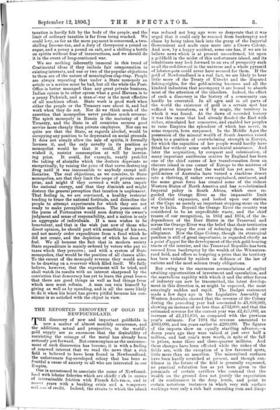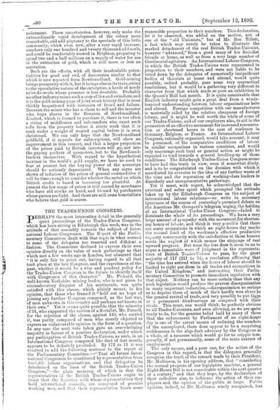THE REPORTED DISCOVERY OF GOLD IN NEWFOUNDLAND. T HE discovery of
new and important goldfields is now a matter of almost monthly occurrence, and the additions, actual and prospective, to the world's gold supply are so enormous that the desirability of restricting the coinage of the metal has already been seriously put forward. But commonplace as the announce- ment of such discoveries has become, it is with a feeling of renewed interest that we read the news that a rich field is believed to have been found in Newfoundland, the unfortunate fog-enveloped colony that has been so fruitful a cause of anxiety to all who are interested in our Empire.
One is accustomed to associate the name of Newfound- land with lobster fisheries which are chiefly r'cli in causes of interminable friction with French fisle rmen, and in reeent years with a banking crisis and a temporary cull . use of credit. Indeed, the straits to which the island was reduced not long ago were so desperate that it was urged that it could only be rescued from bankruptcy and chaos by being taken back into the grasp of the Imperial Government and made once more into a Crown Colony. And now, by a happy accident, some one has, if we are to believe news which is at present unconfirmed, hit upon a goldfield in the midst of this unfortunate island, and its inhabitants may look forward to an era of prosperity such as all the cod-liver-oil in the universe and a whole pyramid of lobster-pots could never have secured for them. If the gold of Newfoundland is a real fact, we are likely to hear little more of the Treaty of 'Utrecht and the disputed fishing-rights, for the gold-mining business and all the kindred industries that accompany it are bound to absorb most of the attention of the islanders. Indeed, the effect of such a discovery in the history of a community can hardly be overrated. In all ages and in all parts of the world the existence of gold in a certain spot has sufficed to transform, as if by magic, the territory in which it was found. At the dawn of recorded history it was this cause that had already flooded the East with riches, stimulated her commerce, and enabled her peoples to raise Empires the splendour of which has never, in some respects, been surpassed. In the Middle Ages the possession of the mineral wealth of South America raised Spain to a position of overwhelming strength in Europe, for which the capacities of her people would hardly have fitted her without some such accidental assistance. And later the acquisition, by conquest and colonisation, of many important auriferous centres by England has been one of the chief causes of her transformation from an obscure island in one corner of Europe to the mistress of the greatest Empire that the world has yet seen. The gold-mines of Australia have turned a trackless desert into a thriving, if rather over-capitalised, continent, and the same great force has created some of the richest Western States of North America and has revolutionised Imperial policy in South Africa, which once re- garded the Orange River as the impassable limit of Colonial expansion, and looked upon our station at the Cape as merely an important stepping-stone on the way to India. Beyond the Orange River the country was considered to be an unprofitable waste, and the chief reason of our recognition, in 1852 and 1854, of the in- dependence of the Boer States in the Transvaal and across the Orange River was the belief that their territories could never repay the cost of reducing them under our allegiance. Now the Cape Colony, though its strategical position is still of great importance, is regarded chiefly as a point d'appui for the development of the rich gold-bearing tracts of the interior, and the Transvaal Republic has been rescued from bankruptcy by the wealth of the Witwaters- rand field, and offers so tempting a prize that its territory has been violated by raiders in defiance of the law of nations and the most solemn treaty obligations.
But owing to the enormous accumulations of capital awaiting opportunities of investment and speculation, and the marvellous rapidity with which it and the other forces of industry can now be transmitted, the latest develop- ment in this direction is, as might be expected, the most amazingly sudden and rapid. The Budget statement made a few days ago in the Legislative Assembly of Western Australia showed that the revenue of the Colony during the preceding year had amounted to £1,858,000, showing an increase of no less than £732,000, and that the estimated revenue for the current year was .X2,425,000, an increase of £1,113,850, as compared with the previous year's estimate. For 1894 the revenue amounted to £863,000, and ten years earlier to £290,000. The figures of the imports show an equally startling advance,—a dozen years ago they were valued at just over half a million, and last year's were worth, in spite of the fall in prices, some three and three-quarter millions. And these changes have been effected while the riches of the fields are, with the exception of a few favoured spots, little more than an assertion. The mineralised surfaces have been hardly scratched at present, and though con- fidence in the future of the field is generally expressed, no practical refutation has as yet been given to the jeremiads of certain cavillers who contend that the wealth on the ground does not justify the expectation of its continuance in the deep levels, and point to certain notorious instances in which very rich surface workings were only a rich bait concealing ruin and disap- pointment. These uncertainties, however, only make the extraordinarily rapid development of the colony more remarkable, and add piquancy to the spectacle of this little community, which even now, after a very rapid increase, numbers only one hundred and twenty thousand odd souls, and could be comfortably stowed in Brighton, preparing to spend two and a half millions on a supply of water for use in the extraction of gold, which is still more or less an aspiration.
Such are the effects, with all their incalculable poten- tialities for good and evil, of discoveries similar to that which is now reported from Newfoundland. Gold-mining brings prosperity with it, but it brings also in its train,owing to the speculative nature of the enterprise, a horde of needy ne'er-do-weels whose presence is less desirable. Probably no other industry raises such a crop of lies and swindlers, and it is the gold-mining page of joint-stock history that is most thickly bespattered with instances of fraud and failure. Between the miner who has a claim to sell and the investor who buys shares in the Bonanza of Newfoundland, Limited, which is formed to purchase it, there is too often a string of middlemen and sub-vendors who exact such tolls from the property before it starts work that it is sunk under a weight of wasted capital before it is even christened. We can only hope that the Newfoundland goldfield, if it appeals for subscriptions, will show an improvement in this respect, and that a larger proportion of the prices paid by British investors will go, not into the gaping pockets of promoters, but to the Newfound- landers themselves. With regard to the hypothetical increase in the world's gold supply, we have no need to fear at present lest the buying power of the sovereign should be seriously depreciated. When any signs are shown of inflation of the prices of general commodities it will be time enough to consider whether the metal on which British credit is based is becoming too plentiful. At present the low range of prices is still cursed by merchants who have old stocks on hand, and blessed by purchasers whose purses are light. And there are still some bimetallists who believe that gold is scarce.



































 Previous page
Previous page